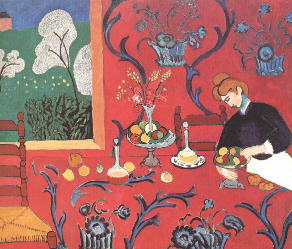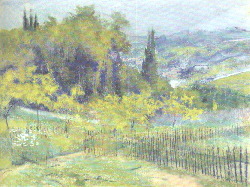

Triumphal poetry
„The World (A Naive Poem)"
„The World" is the second poem written by Milosz in 1943. It is one of the most joyful poems in Polish literature. Milosz himself described this text in the English handbook in such a way:
„ Its stanzas (...) describe the beauty of the simplest things and express the effort of resisting the temptation of total distress" (translated by Izabella Wiencek) let us add: during wartime.
The poem is included in the volume „Rescue" and in comparison with the rest, it shocks by the different topic, and its very cheerful climate. It is the projection of the dream (never fulfilled) about the world in the form „it should be".
In verses of this poem some aspects may be observed:
"His verses (...) describe the beauty of simple things and express an effort one makes to resist overwhelming dispair."
- a man looking to permanent values for rescue; father is a symbol of life's wisdom.
FATHER EXPLAINS (Rescue)
"There where that ray touches the plain
And the shadows escape as if they really ran,
Warsaw stands, open from all sides,
A city not very old but quite famous.
"Farther, where strings of rain hang from a little cloud,
Under the hills with an acacia grove
Is Prague. Above it, a marvelous castle
Shored against a slope in accordance with old rules.
"What divides this land with white foam
Is the Alps. The black means fir forests.
Beyond them, bathing in the yellow sun
Italy lies, like a deep-blue dish.
"Among the many fine cities that are there
You will recognize Rome, Christendom's capital,
By those round roofs on the church
Called the Basilica of Saint Peter.
"And there, to the north, beyond a bay,
Where a level bluish mist moves in waves,
Paris tries to keep pace with its tower
And reins in its herd of bridges.
"Also other cities accompany Paris,
They are adorned with glass, arrayed in iron,
But for today that would be too much,
I'll tell the rest another time
The family home appears as an oasis of quiet.
THE DINING ROOM
(Rescue)
A room with low windows, with brown
shades,
Where a Danzig clock keeps silent in the corner;
A low leather sofa; and right above
it
The sculpted heads of two smiling devils;
And a copper pan shows its
gleaming paunch.
On the wall a painting that depicts winter.
A crowd
of people skate on ice
Between the trees, smoke comes from a chimney,
And
crows fly in an overcast sky.
Nearby a second clock. A bird sits
inside.
It pops out squawking and calls three times.
And it has barely
finished its third and last call
When mother ladles out soup from a hot
tureen.
THE STAIRS (Rescue)
Yellow,
creaking, and smelling of wax
The curved steps are narrow. Near the
wall
You can place your shoe crosswise
But near the banister they hardly
hold your foot.
The boar's head is alive, enormous in shadow.
At
first, just the tusks, then as it grows
The snout roams the ceiling, sniffing
the stairway vault
while the light dissolves into vibrating
dust.
Mother carries down a flickering light.
She walks slowly, tall,
her robe tied at the waist,
Her shadow climbs up to the shadow of the
boar.
And so she struggles, alone, with the cruel beast.
THE ROAD (Rescue)
There where you see a green valley
And a road half-covered with grass,
Through an oak wood beginning to bloom
Children are returning home from school.
In a pencil case that opens sideways
Crayons rattle among crumbs of a roll
And a copper penny saved by every child
To greet the first spring cuckoo.
Sister's beret and brother's cap
Bob in the bushy underbrush,
A screeching jay hops in the branches
And long clouds float over the trees.
A red roof is already visible at the bend.
In front of the house father, leaning on a hoe,
Bows down, touches the unfolded leaves,
And from his flower bed inspects the whole region.BY THE PEONIES (Rescue)
The peonies bloom, white and pink.
And inside each, as in a fragrant bowl,
A swarm of tiny beetles have their conversation,
For the flower is given to them as their home.
Mother stands by the peony bed,
Reaches for one bloom, opens its petals,
And looks for a long time into peony lands,
Where one short instant equals a whole year.
Then lets the flower go. And what she thinks
She repeats aloud to the children and herself.
The wind sways the green leaves gently
And speckles of light flick across their faces.
The charms of the ordinariness soothe the threat of anxiety.
- three evangelical virtues are very strongly stressed here: faith, hope, love. They are the basis for order in the world, they guarantee harmony. The poet advises that we should look at the world with faith, find joy and calm in ordinary, everyday life:
FAITH (Rescue)
Faith is in you whenever you look
At a dewdrop or a floating leaf
And know that they are because they have to be.
Even if you close your eyes and dream up things
The world will remain as it has always been
And the leaf will be carried by the waters of the river.
You have faith also when you hurt your foot
Against a sharp rock and you know
That rocks are here to hurt our feet.
See the long shadow that is cast by the tree?
We and the flowers throw shadows on the earth.
What has no shadow has no strength to live.
The poem „Hope" - it is an appeal to maintain this value
HOPE (Rescue)
Hope is with you when you believe
The earth is not a dream but living flesh,
That sight, touch, and hearing do not lie,
That all things you have ever seen here
Are like a garden looked at from a gate.
You cannot enter. But you're sure it's there.
Could we but look more clearly and wisely
We might discover somewhere in the garden
A strange new flower and an unnamed star.
Some people say we should not trust our eyes,
That there is nothing, just a seeming,
These are the ones who have no hope.
They think that the moment we turn away,
The world, behind our backs, ceases to exist,
As if snatched up by the hands of thieves.
Wheras love will help to understand both the world and people
LOVE (Rescue)
Love means to learn to look at yourself
The way one looks at distant things
For you are only one thing among many.
And whoever sees that way heals his heart,
Without knowing it, from various ills-
A bird and a tree say to him: Friend.
Then he wants to use himself and things
So that they stand in the glow of ripeness.
It doesn't matter whether he knows what he serves:
Who serves best doesn't always understand.
This page, in its earlier 1997 version (use right mouse to open in new window), was created by Aleksandra Kolodziejczyk, Iwona Kowalska, and Dariusz Plygawko, students of the Fifth General Education Liceum in Bielsko-Biala. Marcin Tomana and Piotr Kowalski of the School's Informatics faculty and Urszula Zajaczek of the Polish Language faculty, acted as advisors. Linguistic editing of current version by Peter K. Gessner.
| Info-Poland a clearinghouse of information about Poland, Polish Universities, Polish Studies, etc. |
